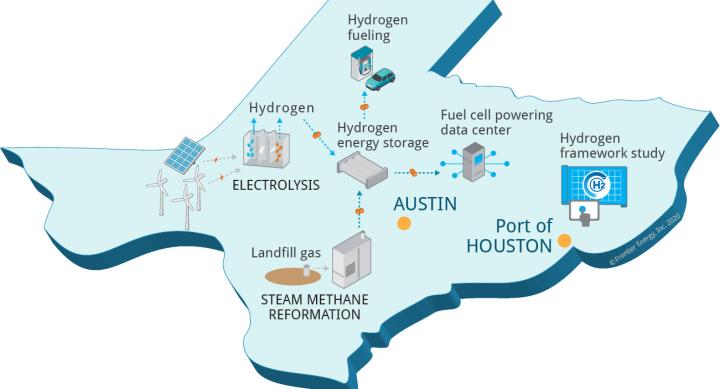
From the Center for Electromechanics at UT Austin: https://sites.utexas.edu/h2/h2scale-project-launched-in-texas/
AUSTIN, TX -- Frontier Energy, Inc., in close collaboration with GTI and The University of Texas at Austin, announces the launch of a U.S. Department of Energy project, Demonstration and Framework for H2@Scale in Texas and Beyond. The project is supported by DOE’s Hydrogen and Fuel Cell Technologies Office within the Office of Energy Efficiency and Renewable Energy. H2@Scale in Texas and Beyond intends to show that renewable hydrogen can be a cost-effective fuel for multiple end-use applications, including fuel cell electric vehicles, when coupled with large, baseload consumers that use hydrogen for clean, reliable stationary power.
Frontier Energy is partnering with GTI, University of Texas at Austin, OneH2, Texas Gas Service, SoCalGas, Toyota Motor North America, Shell, Mitsubishi Heavy Industries, Air Liquide and PowerCell Sweden AB to conduct two related projects:
- UT-Austin will host a first-of-its-kind integration of commercial hydrogen production, distribution, storage, and use. The project partners will generate zero-carbon hydrogen onsite via electrolysis with solar and wind power and reformation of renewable natural gas from a Texas landfill. It is first time that both sources of renewable hydrogen will be used in the same project. The hydrogen will power a stationary fuel cell to provide clean, reliable power for the Texas Advanced Computing Center and supply a hydrogen station with zero-emission fuel to fill a fleet of Toyota Mirai fuel cell electric vehicles.
- At the Port of Houston, the project team will conduct a feasibility study for scaling up hydrogen production and use. The team will assess available resources, prospective hydrogen users, and delivery infrastructure, such as existing pipelines that supply hydrogen to refineries. The study will examine policies, regulations, and economics so that industry can develop a strategic action plan to present to policymakers to enable heavy-duty fuel cell transportation and energy systems.
“H2@Scale in Texas and Beyond brings hydrogen industry leaders together with enthusiastic and important new participants to design, build, and operate the first dedicated renewable hydrogen network. It will demonstrate infrastructure safety and reliability in a real-world situation,” said Nico Bouwkamp, Frontier Energy’s H2@Scale project manager. “The project will also leverage Texas’ extensive resources—wind power, solar energy, underground salt-dome storage formations, hydrogen pipelines, natural gas infrastructure, international port operations, and a large, concentrated industrial infrastructure—to demonstrate the potential of DOE’s H2@Scale initiative.”
“Hydrogen can be an important link between renewables and existing energy infrastructure,” said Ted Barnes, GTI R&D Director, Energy Utilization. “The focus of H2@Scale is to enable affordable and reliable large-scale hydrogen generation, transport, storage, and utilization in the U.S. across multiple sectors, and this project will integrate a wide variety of new and existing technologies and identify innovative concepts to develop robust hydrogen solutions. GTI has decades of experience and a long-standing commitment to hydrogen research and technology development, and we are excited to be a part of this project focused on low-carbon energy and integrated energy networks.”
“Hydrogen has significant potential to contribute to our nation’s domestic energy resources, enhance energy security, and enable economic growth, and Texas has the potential to become a leader in this space,” said Michael Lewis, the H2@Scale Principle Investigator and a Sr. Research Engineer at the Center for Electromechanics at UT-Austin. “The Center for Electromechanics and the University are pleased to host the H2@Scale R&D and will help educate a generation of engineers who can make these academic advances real.”
The project started on July 1, 2020 and will continue for three years. The project partners committed half of the funding for the $10.8 million project that will demonstrate how hydrogen production and use can enable grid resiliency, align domestic industries, increase competitiveness, and promote job creation.
“EERE funding and leadership of this project are crucial to show that a resource-rich state like Texas can continue its role as a leading energy provider as the country transitions to renewables,” Bouwkamp concluded.
About Frontier Energy
Frontier Energy is a nationwide professional services and engineering firm with expertise in alternative transportation, building decarbonization, advanced energy efficiency, and market introduction of transformative technologies. Since 1999, Frontier Energy has staffed and managed the California Fuel Cell Partnership, a public-private collaborative dedicated to hydrogen fuel cell transportation. Based in San Ramon, California, Frontier Energy has offices in Texas, New York, Minnesota, and throughout California. Please visit www.frontierenergy.com
About GTI
GTI is a leading research, development, and training organization that has been addressing global energy and environmental challenges by developing technology-based solutions for consumers, industry, and government for nearly 80 years. www.gti.energy
About The University of Texas at Austin
UT-Austin ranks among the 40 best universities in the world. It supports some 51,000 diverse students with top national programs across 18 colleges and schools. As Texas’ leading research university, UT attracts more than $650 million annually for discovery. The university contributes to the advancement of society through research, creative activity, scholarly inquiry and the development and dissemination of new knowledge, including the commercialization of University discoveries. sites.utexas.edu/h2
About H2@Scale
H2@Scale is a U.S. Department of Energy (DOE) initiative led by the Office of Energy Efficiency and Renewable Energy (EERE) to enable affordable hydrogen production, storage, distribution, and utilization across multiple sectors in the economy. It includes DOE funded projects and national laboratory-industry co-funded activities to accelerate research, development, and demonstration of hydrogen technologies and advance the H2@Scale vision. For more information, visit www.energy.gov/eere/fuelcells/h2scale.
For project information, please contact:
Michael Lewis
H2@Scale UT Principal Investigator
UT, Center for Electromechanics
For media requests, please contact:
Liz Arredondo

